All the Answers
Well-known member
Who are the picketers involved in the extortion case and the heads of the organizations investigated - Infobae

Source:

Quiénes son los piqueteros involucrados en la causa por extorsión y los jefes de las organizaciones investigadas
Los detalles de una causa escandalosa que revela el abuso de autoridad ejercido por dirigentes sociales y piqueteros contra las personas vulnerables que dicen defender. Se quedaban con parte del dinero que cobraban por parte del Estado. Les exigían asistir a movilizaciones o repartir volantes de...
May 15, 2024
The details of a scandalous case that reveals the abuse of authority exercised by social leaders and picketers against the vulnerable people they claim to defend. They kept part of the money they received from the State. They were required to attend demonstrations or distribute leaflets for official candidates.
By Andres Klipphan
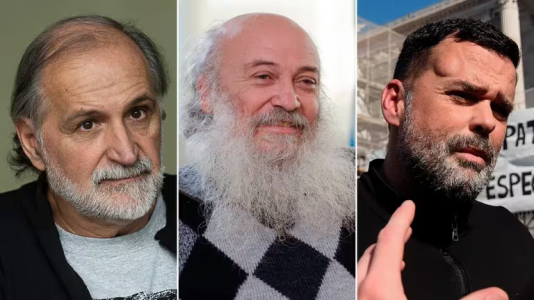
Belliboni, Pérsico and Menéndez, three of the main names that are being observed for the extortion case
The judicial case that exposed the impudent, extortive and enslaving maneuvers carried out against the poorest sectors of Argentina by piqueteros leaders who are part of the Polo Obrero and the Front of Organizations in Struggle (FOL), and social representatives who respond politically to organizations that were part of the government of Alberto Fernández , and now of Governor Axel Kicillof , such as Barrios de Pie; He illuminated what was in darkness.
What was known but was swept under the rug. What the justice itself investigated in dozens of files but they made no progress. What the authorities should know but did not report because it was functional or encouraged them. What the investigation by prosecutor Gerardo Pollicita and Judge Sebastián Casanello would expose , could not have been carried out if behind the maneuvers there were not leaders who were on the "two sides of the counter", that is, on the one hand, they delivered through the State, in this case the Ministry of Social Development, social plans, such as Promoting Work, and food, for the most vulnerable sectors; and on the other, they themselves received and managed them from the cooperatives, dining rooms and snack bars that were part of those organizations and social movements that, in addition, were part of political parties such as the Frente de Todos - which became Union for the Homeland -, and on the other hand, the Left and Workers' Unity Front .
If this were a play, it would be composed of at least two acts: in the first, the main actors take center stage, who, at least for now, are not named in the judicial proceedings. Neither magistrate, prosecutor nor witnesses have mentioned them. For now.
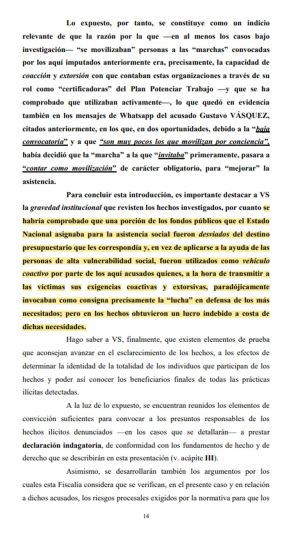
Part of the case file to which Infobae had access
Each one has their own weight and are the heads of each of the organizations mentioned or that were not named but were part of the multimillion-dollar management that the Fernández government allocated to social programs, of which it made its banner and which it administered through its three Ministers of Social Development: Daniel Arroyo , Juan Zabaleta and Victoria Tolosa Paz .
In the second act, the actors are the 27 defendants in the file who, except in a couple of cases, are third-level picketers and leaders in the structure that reveals the dark plot through which hundreds of billions would have been diverted. of pesos to carry out politics, but that is to maintain that degree of impunity if the heads of those structures did not give the go-ahead.
In the basis of the prosecutor's office for requesting the arrests, raids and investigations, Pollicita highlights “the institutional seriousness of the facts investigated, since it has been proven that a portion of the public funds that the National State allocated for social assistance were diverted from their destination. budget that corresponded to them and, instead of being applied to the help of people of high social vulnerability, they were used as a coercive vehicle by those accused here who, when transmitting to the victims their coercive and extortion demands, paradoxically invoked as precisely the slogan of the 'fight' in defense of those most in need; but in fact they obtained undue profit at the expense of said needs.”
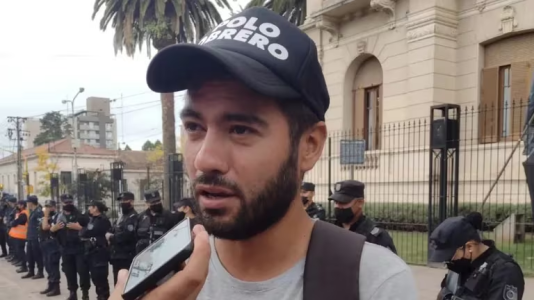
Jeremías Cantero, from the Polo Obrero
To be intellectually honest, it must be said that until now in the file the surnames of the responsible heads of the organizations to which they belonged, nor of former officials, have not emerged. That would be the third act of the theatrical work - certainly dramatic - that may be written when the investigations begin against the accused whose assets were inhibited yesterday and by decision of the judge in the case have not been detained preventively.
There are 27 defendants in the file and they are part of two picketing movements. They are also among the most active when it comes to demanding from all governments - regardless of political color - for more plans and food for soup kitchens and their own structures. These are the Polo Obrero and the Front of Organizations in Struggle (FOL). The third space that appears mentioned is Barrios de Pie , one of the movements that is part of the Popular Economy Workers Union (UTEP) and whose main organizations were part of the former ruling party. In fact, the national coordinator of Barrios de Pie is Daniel Menéndez , former official in the Ministry of Social Development and now of Governor Axel Kicillof.
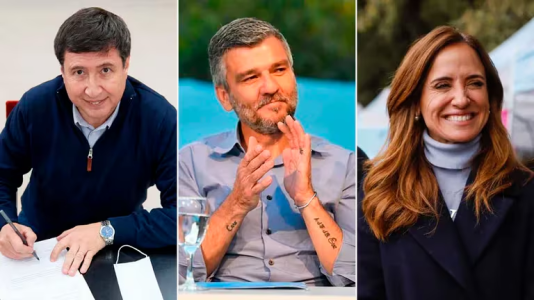
Daniel Arroyo, Juan Zavaleta and Victoria Tolosa Paz, the three ministers of Social Development of Alberto Fernández
Polo Worker
The main reference of the Polo Obrero is Eduardo Belliboni . Until now, in this case, the leader was not mentioned. Yes, on the other hand, one of those close to him who is part of the national board of that organization appears very active: Jeremías Cantero . When Belliboni fell ill with pneumonia and was hospitalized for more than 20 days, Cantero took charge of communication. He was part of the “List 502″ of the Left Front and Workers Unity, in the general elections of October 22, 2023, he ranked seventh as a candidate for national deputy for the Autonomous City of Buenos Aires.
Together with Belliboni, he actively participates in the mobilizations. In addition, between March 1, 2020 and April 1, 2024, he was a Social Development official. He fulfilled “administrative support” functions in the then Secretariat of Social Economy led by Emilio Pérsico, the leader of the Movement.
That Secretary of State was responsible for the largest program, together with Alimentar, of the Social Development portfolio, Potenciar Trabajo . The beneficiaries had to carry out 20 hours of tasks in a Management Unit, many of which were from the Polo Obrero, but also from Evita and other social movements, such as Somos Barrios de Pie, the Corriente Clasista y Combativa, referenced in Juan Carlos Alderete; the Darío Santillán Popular Front of Dina Sánchez; or the Movement of Excluded Workers, whose main former leader was Juan Grabois, who since he was a presidential candidate for Unión por la Patria, stepped away from leadership.
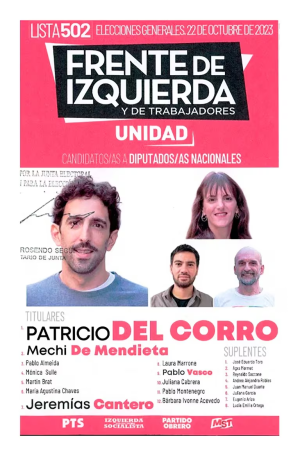
Jeremías Cantero, one of the main defendants, was a candidate for deputy for the Left Front
Cantero was in charge of signing agreements with the Management Units that received multimillion-dollar subsidies from the National State. Anyway, everything there went through Persico. The Evita de Pérsico is part of Unión por la Patria.
Let's go back to Cantero. He was also part of the Polo Obrero Civil Association.
As described by the prosecutor, at this point in the investigation: “It was verified – with the degree of provisionality typical of the present procedural stage – that there were people placed on a step higher than the referents of each dining room, among whom Jeremías was identified. Cantero —who coordinated the operation of several soup kitchens in the City of Buenos Aires and intervened from that position in the decision-making regarding coercive and extortionate demands on the victims.” In that same maneuver, “Elizabeth del Carmen Palma—who was in charge of loading into the computer system the data that allowed the victims to receive or stop receiving the social plan”—was also identified.
Both Cantero and Palma “would also intervene in the decisions about the destination of the proceeds of crime, as can be seen from a telephone conversation on March 27, 2024 held between the two, in which Palma expresses to Cantero his concern regarding the possibility of being investigated 'for money laundering' in relation to the “cooperatives that the capitas are receiving”—mentioning only the name “El Resplandor”—, to which Cantero proposed to “think of a plan for where this is going,” for which money that they will receive from the beneficiaries who were fined 10,000 pesos if they did not attend a march, among other maneuvers described in the case.
For the prosecutor: "These elements suggest that the activities of the accused were also aimed at channeling illicit funds from extortion through 'cooperatives', with the final destination of that money being unknown to date."
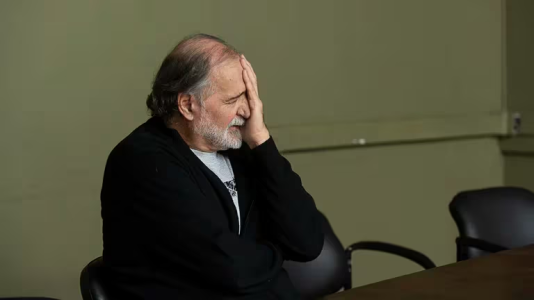
Eduardo Belliboni, leader of the Polo Obrero, is not mentioned in the case for now.
Another of the accused from the Partido Obrero is Patricia Iramain , who published “the list of people who will not receive merchandise for not going to the mobilizations, or who will be demoted to the last category (waiting list to receive food or a social plan) for for the same reason — while others enter the dining room for having complied with the set time of attendance at the mobilizations.”
Gustavo Vásquez , another of the accused, appears in the case asking for “medical justification” from one of the victims because he could not attend a mobilization.
For her part, Elizabeth Mamini announces through a WhatsApp group that "she will be collecting the 'capitas' and that they must catch up." It was a percentage of the social plan that they received from the State and that they supposedly had obtained through the Polo Obrero.
The story of the case is increasing in aberrant abuses. Lucca Philippe Quispe Rashuaman “invites only 'colleagues who actively participate' to collect merchandise - and even charges an additional amount to each one as 'freight' - and that the accused Gloria Jaramillo Morales clarifies that the distribution is as always only those who have mobilization.'”
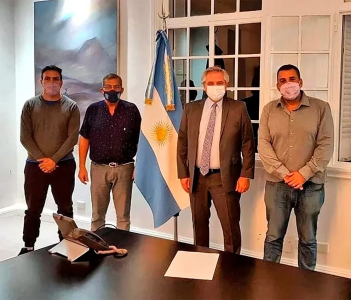
Alberto Fernández and Daniel Menéndez (on the right), leaders of Barrios de Pie, are accused in the file of extortion
The food that had to be removed was delivered by the then government of Alberto Fernández to social organizations to be distributed to canteens and picnic areas. The leaders, on the other hand, would have used them as a method of coercion so that vulnerable beneficiaries would swell the ranks of the left-wing picketers.
Minister Sandra Pettovello cut off this type of intermediation and discovered, through audits, that half of the dining rooms and picnic areas denounced by social movements “ do not exist .”
The prosecutor also describes among his evidence that the Rivadavia I, La Carbonilla and Mariano Ferreyra canteens, managed by Asociación Civil Polo Obrero, “the procedural object of this case constitutes the conduct of a group of people who, acting in a coordinated manner under distribution of roles and since - at least - May 2021, its purpose was the commission of multiple illicit activities to the detriment of the beneficiaries of social assistance that were intended to appropriate a portion of the public funds allocated by the National State for said assistance and , at the same time, coerce the beneficiaries, with the aim of forcing them to participate in 'mobilizations'. convened by the Polo Obrero group. With these objectives, the defendants let the neighbors and potential attendees of the soup kitchens know that, to become beneficiaries of the Potenciar Trabajo Plan, they had to attend a certain number of 'marches' or 'mobilizations of the “Polo Obrero”, which increased their chances of of entering a 'waiting list' from which, subsequently and as determined by the defendants, they could become registered as beneficiaries of said plan—which they called “promotion”—.”
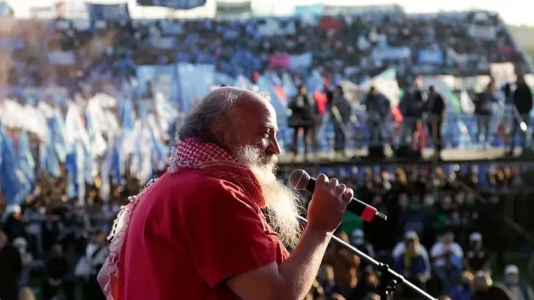
Emilio Pérsico, leader of the Evita Movement and former Secretary of Popular Economy, Empower Work depended on him. He is linked to cooperatives and soup kitchens. He has not been named in the case until now.
The letter reveals that "once the social assistance program was accessed, the delegates of each soup kitchen let the beneficiary know that, in order to continue receiving the benefit - which today represents $78,000 per month - he had to attend the 'marches' and ' mobilizations' indicated by the dining room leaders; Otherwise, he would be discharged from the plan. In turn, if you attended a certain number of marches - set by those responsible for the dining room - you could be promoted to the second rank of beneficiaries, who received a higher monthly amount - between $150,000 and $200,000, depending on each case - and who were called 'essential', 'gang' or 'nexus'; and above that category were the 'delegates', who earned even more money—between double and quadruple the basic benefit—and had greater responsibilities. Likewise, victims were required that, if they did not attend a mobilization, they must justify the absence and accompany the corresponding records of the reasons that prevented participation - such as the existence of medical appointments; because otherwise it would be noted as an absence; which could cause the imposition of 'sanctions'.”
The “sanctions” ranged from not receiving merchandise from the cafeteria for a certain period of time, to “being demoted in category or being discharged from the Potenciar Trabajo Plan.”
From the members of all categories, in the three canteens, the defendants - as described by the prosecution - "required, in addition to attending the marches and mobilizations, the payment of monthly 'capitas' equivalent to 2% of the social aid." perceived in each case; which was always paid in cash, the first days of the month; and, in case of non-compliance, they were included in the list of defaulters which, depending on the delay and the criteria of the accused, could lead to the decision to demote the debtor in category until even ordering the withdrawal of the Potenciar Trabajo Plan. , so it went back to the 'waiting list'.”
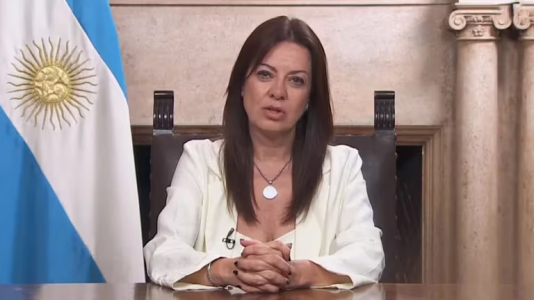
The Minister of Human Capital, Sandra Pettovello, took power away from the social leaders and picketers, they no longer outsource the food. She denounced that one out of every two dining rooms "does not exist" Photo NA
Pollicita detailed in her writing that: “The group of people who make up this group, on a higher scale, are made up of the accused Jeremías Cantero, Elizabeth del Carmen Palma, Gianna Puppo, María Isolda Dotti, Iván Ezequiel Candotti and Gustavo Guillermo Vásque z—who They fulfilled the functions of leading and coordinating the actions of its members -, while the delegates of each dining room are members - Dina Patricia Iramain, Brisa Noelia Paucara Choque, Ronald Argas Rocabado, Elizabeth Galindo Mamani, Cinthya Delgado Vilches, Lesli Salirrosas Castillo, Damariz Erika Villafuerte, Blanca Beatriz Chuquimita Tarquino, Gloria Jaramillo Morales Lucca Philippe Quispe Rashuaman, Yoao Ariel Escobar Rojas and “Francisca” (not yet reliably identified)—who fulfill specific roles within each dining room, consisting of transmitting the coercive demands, taking assistance lists and demand and collect money from victims.”
María Isolda Dotti, alias “Tango”, one of the leaders who conveyed to the victims “the coercive demands” while shouting while “they violently threatened the members of the dining room that if they did not go to the marches they would take away their rights.” Work Enhancement Plan”.
Dotti, in the 2017 elections, ranked 11th as a candidate for the Buenos Aires legislature for the Left and Workers' Unity Front, led that year by Myriam Bregman and followed in second place by Gabriel Solano.
In the raid carried out on Dotti in an apartment on the ground floor of Avenida Chiclana at 3000, in the Buenos Aires neighborhood of Parque Patricio, the police found 54,448 dollars and 479,000 pesos .
Front of Organizations in Fight (FOL)
The justice found an action similar to that of the Polo Obrero, in FOL leaders who were in charge of the Comedor Kuña Guapa, located in Villa 21-2
The prosecutor proved in that place that there was a group of people “made up of Carlos Fernández Kostiuk, María Cecilia Cowper, Mercedes Fossat, Manuel Alonso, Lorenzo “Toto” Martelli, Leticia Maribel Duarte Romero, Ada Mabel Vera Peralta and Nilsa Elena Torresa .
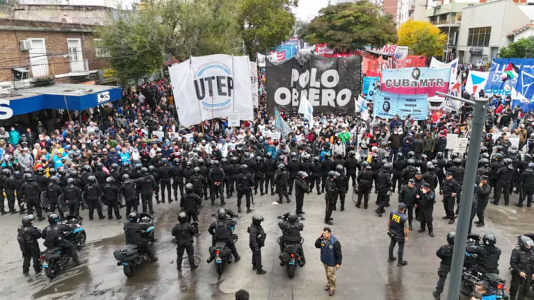
If they did not go to the marches, the picketers took away the plans from the beneficiaries of the most vulnerable sectors
Acting in a coordinated manner and “under distribution of roles and since - at least - October 2021, its purpose was to commit multiple illicit activities to the detriment of social assistance beneficiaries who attended the “Kuña Guapa” dining room, the judicial proceedings state. and it is explained that "they appropriated a portion of the public funds allocated by the National State for said assistance and, at the same time, coerced the beneficiaries, with the aim of forcing them to participate in mobilizations of the group Front of Organizations in Struggle." ”.
If they missed one of the “mobilizations” they were charged a “fine” of $10,000 for each absence, while if they missed three “marches” or “mobilizations” they were removed from the Potenciar Trabajo Plan . In the lengthy and outrageous description of it, the judicial official says: "On the other hand, every two months they gave the beneficiaries a box with merchandise, which was sometimes taken from them by the delegates as a sanction for missing the mobilizations."
Standing Neighborhoods
The national coordinator of Pie neighborhoods is Daniel Menéndez . He was part of the Secretariat of Social Economy, under Emilio Pérsico and is now an official of Governor Axel Kicillof . Barrios de Pie is also part of UTEP.
The investigation discovered, through complaints from victims to number 134 enabled by the Ministry of Security, headed by Patricia Bullrich, that in the Caminos de Tiza Comedor, run by Barrios de Pie “the existence of a group of people composed of Gloria Paraguay Estrada, Rossmery Grande Arancibia and Nery Acha Daza ", as in the previous cases, "appropriated a portion of the public funds allocated by the National State to said assistance and, at the same time, coerced the beneficiaries, with the aim of forcing them to participate in mobilizations of the Barrios de Pie group.”
In this case, the marches were in favor of Alberto Fernández, or going out to campaign “house to house” to vote for the Unión por la Patria candidates.
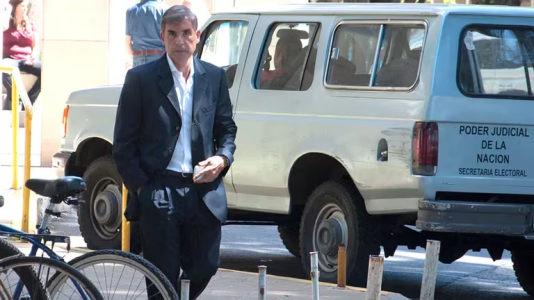
Prosecutor Gerardo Pollicita is in charge of the file that shakes the picketers (Adrián Escandar)
“With these objectives, the defendants let the neighbors and potential attendees of the dining room know that, to become beneficiaries of the Potenciar Trabajo Plan, they had to not only collaborate with the dining room but also attend marches or mobilizations of Barrios de Pie and distribute leaflets from the political candidates who were indicated, at election time, all for a period to be set by the accused, which would allow them to be registered as beneficiaries of said plan.”
The evidence collected in the file reflects: “On the other hand, the defendants required the victims to pay $300 each time they received a bag with food or non-perishable merchandise, which the National State delivered to the dining room, which happened approximately once. a month".
At the same time, on occasions, according to the complaints, "the defendants sold the food they received from the Government in the neighborhood, demanding that the victims collaborate in the marketing." The members of Barrios de Pie “also required each beneficiary of the Potenciar Trabajo Plan to pay a quarterly fee of $1,950, without providing any receipt in exchange, but writing down in a notebook who paid and who did not.”
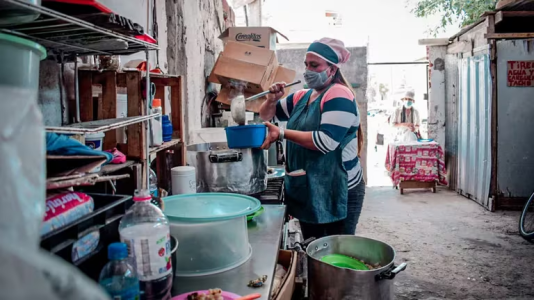
If they did not go to the marches, they punished the vulnerable people who attended the community kitchens.
From both sides of the counter
The illicit maneuvers investigated occurred within the framework of the two main programs of the then Ministry of Social Development, today reduced to the Secretariat of Children, Adolescence and Family, which is part of the organization chart of the Ministry of Human Capital, headed by Sandra Pettovello.
Within the Social Development portfolio, there were two secretariats that managed the largest budget items and programs, that of Social Economy and that of Social Inclusion.
The first was led by Emilio Pérsico, a former Montonero leader, and visible head of the Evita Movement. That organization was the one with the largest number of work cooperatives and canteens. Evita is also part of Unión por la Patria and fought for Alberto Fernández first and for the presidential candidate of that space, Sergio Massa.
The main program of the Secretariat of Social Economy was Empowering Work . Under Persico's orbit, the program for those who did not have regular employment was up and down. They had to perform 20 hours of weekly tasks in a Management Unit . For example, cooperatives.
The Evita Movement of Pérsico and others that are part of the Popular Economy Workers Union also had this type of cooperatives and canteens.
The operation of the cooperatives and part of the agreements were under another leader of the Evita Movement, Alexandre Roig , the then head of the National Institute of Associativism and Social Economy.
The Secretariat of Social Inclusion was in charge of the Alimentar Program . Among its scope was the National Registry of Dining Rooms and Picnic Areas. and the National Food and Nutrition Security Program. Food for the soup kitchens and social organizations came from there .

